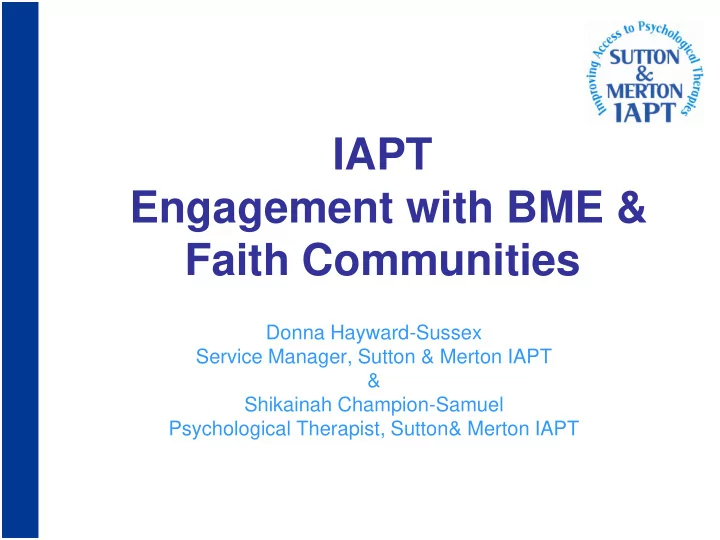

IAPT Engagement with BME & Faith Communities Donna Hayward-Sussex Service Manager, Sutton & Merton IAPT & Shikainah Champion-Samuel Psychological Therapist, Sutton& Merton IAPT
Presenting: • What is IAPT • The service offer • Our work with the temple and with the Tamil community • Achievements • Replication of learning – extending reach
What is IAPT? • Improving Access to Psychological Therapies (IAPT) is a government initiative to make NICE- approved psychological treatments more widely available to the general public • Common mental health problems anxiety and depression (1:4 of us will experience at some point in our lives) • Varying severity (defined by level of distress or impact on function e.g.. social or occupational) • Risk of suicide in people who are depressed is about 2-3 times that of non-depressed population • Primary care – economically sensible (people of benefits, and into work)
Service Offer… 1. Evidence-based psychological treatments for people suffering from depression or anxiety problems – Depression – Generalised anxiety disorder (GAD) – Panic / agoraphobia – Health anxiety – Social anxiety disorder – Obsessive-compulsive disorder (OCD) – Post-traumatic stress disorder (PTSD) – Bulimia nervosa A ‘stepped care’ approach 2. – People receive the least intensive treatment necessary to get better (in line with NICE)
Pathway – Step up/ Down Signposting to Step 2 Discharge other services Mood Management Triage to Steps 2, 2a Panic & Phobia Stress & Worry course and 3 (Not 2b) course (6 sessions) course (6 sessions) (6 sessions) Step 2 – Ass and Mindfulness-based treatment – possible LTC CBT group step up to 2a, 2b or 3 Groups (8 sessions) (Step down from step Guided CBT One-day CBT Step 1 3 Ass only) (6 sessions) workshops Step 2a – Ass and Watchful waiting Books on prescription treatment, or step up Step 2a Discharge Mood Manager to 2b or 3 (No step One-day CBT workshops down) Ass (other) Individual Step 2b – Ass and Individual Transactional Psychodynamic treatment - possible Analysis (TA) counselling step up to 3 (step counselling Occupational (8 sessions) down to 2a only) (8 sessions) health Step 2b 3-month follow-up Discharge Self-referrals Ass Triage assessment Pathway – Step up/ TA Psychotherapy Employers Down group (16 sessions) Step 3 – Ass and GP referrals & treatment (possible health step down to 2b, 2a professionals and 2). Step 3 Discharge Ass CBT Depression CBT Anxiety Individual CBT Individual IPT groups groups (8 - 20 sessions) (8 - 20 sessions) (8 sessions) (8 sessions) Individual DIT Couples Therapy Individual EMDR LTC (8 - 20 sessions) (8 - 20 sessions) (8 - 12 sessions) Groups Employment service Discharge available at every step.
How to access IAPT… 1. Patients are referred by their GP or a community organisation , or they can self- refer . 2. They are then called and booked in for a structured ½-hour telephone assessment . 3. Once the assessment has been completed, clients are offered the most appropriate intervention to meet their needs.
Example of improving access in partnership …
How our involvement with the community started… • Awareness talks – building relationships – Basics of CBT – What is available to the community – What is most suitable – PTSD, What can be done – Mindfulness – how it can be helpful – Working Together!
At the current time we are… • Using the temple rooms to see patients - a setting they are comfortable and familiar with • Developed a telephone script for a helpline to ‘signpost’ people to the best services • Running CBT groups for Depression Management in Tamil • Translated Mood Manager DVD and psycho educational materials into Tamil
Tailoring interventions for local need • We are in our third Depression Management group. The first two produced good outcomes, with at least 75% showing non clinical scores at the time of discharge. • The group is being run for 12 weeks as against our regular 8 week groups. • We are now aiming to run a similar Tamil group in Sutton as well. • Using of different names for group, keeping in mind the stigma of words such as Depression.
Achievements: Group 1 Graph depicting average reduction in each measure 35 30 PHQ-9 25 GAD-7 Scores 20 W&SAS Phobia 1 15 Phobia 2 10 Phobia 3 5 0 Pre Post Treatment Stage
Achievements: Group 2 Graph depicting average reduction for each mesaure 35 30 PHQ-9 25 GAD-7 Scores 20 W&SAS Phobia 1 15 Phobia 2 10 Phobia 3 5 0 Pre Post Treatment Stage
What we have learned • A better sense of what local people want from our service • Importance of working with the community to improve access for all • Adapting our existing interventions so that they are most accessible • Assume nothing and listen! • Work together to find solutions
Our Principles Support an awareness programme for community leaders in identifying common signs and symptoms of anxiety & depression, in a way that translates well to community ideas and understandings Identify community venues that are more acceptable and non medical! Work with our peers to identify people who need our help, and support them to access the appropriate services
For more information Dr Hendrik Hinrichsen, Clinical Lead 07736 818 236 or 020 8254 1034 Hendrik.Hinrichsen@swlstg-tr.nhs.uk Or Donna Hayward-Sussex, Service Manager, Tel: 0208 4073959; Mob: 07736818242 Donna.Hayward-Sussex@swlstg-tr.nhs.uk To access the IAPT service, call our freephone number: 0800 032 4207
Recommend
More recommend